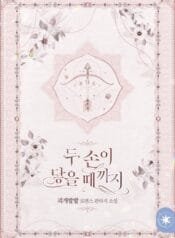“Welcome, Duchess.”
“Bishop.”
The elderly bishop greeted me warmly. The cathedral was as magnificent in spring as always, but his room was starkly modest. I took a seat at a plain table, seemingly built for function alone, and sipped the tea he poured for me.
“How is your health?”
“Much better, thanks to your concern.”
“Perhaps it’s because of the gloomy weather, but I have a feeling that your visit is not for a happy reason.”
I was surprised by the bishop’s intuition. My expression must have surprised him as well.
“Am I right?”
“There’s something I need to show you.”
I took out the full statement of reasons for divorce, prepared by Theodore, and handed it to him. The bishop, adjusting his single-lens spectacles, examined the document for a while, then sighed softly.
“A regrettable matter.”
Setting down the papers, he looked at me.
“I need your signature, Bishop.”
I showed him the blank space on the divorce document where his signature was required. Instead of signing right away, he closed his eyes and spoke gently.
“Signing is not difficult.”
Yet he kept his eyes closed, as if deep in thought. I waited patiently, feeling assured that he would sign. Finally, after a long silence, he spoke.
“But I’m not sure if my signature would truly help the Duchess.”
“Then consider it as helping the Keppel family.”
“Do you think the Duke will remarry?”
I was taken aback. I hadn’t expected such a direct question from him.
“If he’s the person I know, he’ll likely grow old alone. And you, Duchess, don’t seem to need another match either.”
“Bishop.”
“Ah, do not worry. I’ll sign.”
The bishop reassured me and instructed his assistant to bring him a quill. I sighed in relief. The bishop, who oversaw the diocese, was one of six cardinals in line for the papacy, and a distant relative of my mother, thus closely connected to the Keppel family.
In terms of family ties, he was Ian’s maternal great-uncle. Though he might use the Keppel family as a stepping stone if he aspired to the papacy, I believed he was not that type of person.
“Are you fully prepared?”
Was he referring to my divorce preparations? Though there were still matters to settle, like housing, I simply nodded quietly. The bishop, who had been watching me intently, sighed and reluctantly signed the document.
“Adriana’s hope is extinguished now.”
I flinched. Without prompting, the bishop continued in a low voice.
“I was actually against it. Not due to differences in status or dowry concerns, but because your purpose was unclear. Some might say it was for money, but I never saw you as someone with a particular love of material wealth.”
I sat quietly, waiting for him to finish.
“Neither power nor wealth, nor ambition… Indeed, in all my time presiding over weddings, I had never seen a bride with such a look of resignation. Even in an arranged marriage, most people have their own aspirations. But when you took your vows, it was as if you had given up on life itself.”
“…”
“But look at you now. Presenting this divorce document with a glimmer in your eye.”
The bishop laughed heartily. Embarrassed, I glanced away. Was it that obvious?
“Adriana called you her ‘hope.’ That’s why I couldn’t oppose it. But now I regret it. So, tell me, Duchess, if you didn’t want to, why did you go through with a marriage you didn’t desire?”
The bishop seemed to be inviting me to explain myself. I felt taken aback. We had always kept our relationship polite and formal, so I hadn’t expected such a question. Was he suddenly trying to act as a family elder? I swallowed hard.
“My mother was born a noble’s daughter. She cut ties with her family when she married my father. Their life together in a small estate was a hardship for her. After my father’s passing, she had no one to rely on… I was her everything. I tried my best to make her happy, but I was insufficient. So…”
If only I could articulate it better. The bishop nodded quietly as I stumbled through my clumsy explanation.
“I see. So, did your mother become happy?”
My mother had always blamed herself for pushing me into marriage, believing it was the cause of my unhappiness.
“No.”
“Then you failed.”
I lowered my head in silence.
“Your choices brought unhappiness to many people.”
Listening to the bishop’s reprimand wasn’t a big deal. I had gotten his signature, after all. With the Pope bedridden, the six cardinals were currently handling papal duties, so I didn’t need additional approval from the Vatican. With a bit more patience, I would be able to submit the required documents to court. Then, the only remaining task would be drafting a settlement with Ian.
“But more than anything, your greatest sin was to plunge yourself into unhappiness.”
I could dismiss his words, so why did I feel such an urge to cry?
“At the time, it was the best choice I had.”
Could I have chosen differently if I went back to that time? Should I have resented my mother for pooling everything she had to arrange a matchmaker? Should I have fought with my mother, who barely held on through years of depression, believing my marriage was her only hope, to prove to her that her hope was unfounded? I couldn’t. I pitied her too much for that.
It wasn’t as though I had other options outside of the Keppel family. Some generous families were willing to accept a bride without a dowry, but when I mentioned my mother would have to come along, they all hesitated. The only family willing to take responsibility for my mother as well was the Keppel family. My marriage was entirely for my mother’s sake; I couldn’t abandon her in that rural estate while I lived a noble life on my own.
Strangely enough, I felt that even if I were to return to the past with the knowledge of the future, I would make the same choice. I would marry Ian, and this time, I would try harder. I’d strive to be a proper duchess, warn him of assassins in advance at the New Year’s Ball, and then with Ian… I stopped myself. If I did that, I would only be deceiving Ian again. Deceiving him… once more.
“If you intended to continue living with that lifeless look in your eyes, I wouldn’t be giving you this lecture. But since it seems you’re changing, I’ll say this: this time, try to take each step with care.”
To hide my expression, I lifted my teacup. I wanted to appear calm as I drank, but in the end, I set it down without taking a sip, feeling disheartened.
“I thought I was always careful with my steps.”
“But they weren’t for your own path, were they?”
“…”
“Look closely at the path. Consider whether it’s truly the path you want. Only those who can save themselves can go on to save others.”
A path I wanted? Had I ever had such a thing? This world is too difficult to dream of something different. Among the girls my age, most dreams seemed to revolve around being a devoted wife and mother, or becoming Cinderella. Though I couldn’t have children, I could be a good wife or a Cinderella. It wasn’t something I wanted, but rather a path I was pushed toward. I quietly pondered what it was that I wanted.
“For now, I want a divorce.”
“Why does it have to be a divorce? Not that I’m opposing it, I’m simply curious. The woman I know is quiet and reserved, so it’s surprising that such a person would want to cause the scandal of a divorce.”
The bishop, as if wanting to prove his point, held out the signed divorce papers. I put them carefully in the envelope and clutched it tightly.
Why do I want a divorce? I never expected anyone would ask me that. Even Ian hadn’t asked. Everyone probably assumed it was because I disliked him and wanted a divorce. But honestly, I didn’t dislike Ian that much. More than that… I smiled faintly.
“I’m not really sure. My goal right now is simply divorce. If I don’t go through with it, I think I’ll just keep living for Ian, for the Keppel family. So… I feel like I need this divorce to find myself.”
It was the first time I had voiced this, even to myself. Now that I said it out loud, it felt even more urgent. That’s probably what I would do: live for Ian, live for the Keppel family, and eventually forget what I really wanted, just like now.
“Just to make sure—don’t consider entering a convent after your divorce.”
“Pardon?”
I blinked at the unexpected remark.
“You sounded as though you were intent on severing all ties with the secular world.”
The bishop sighed.
“Sometimes, there are people like that. People who, without knowing what they truly want, marry and live as others do, only to later find devotion to faith and seek to dedicate their life, divorcing as part of that commitment.”
“…I have no intention of doing that.”
“I see. But I respect those who do. You might not know, but those who abandon their families to join the clergy are more respected than someone like me, born a second son with no other choice but to enter the Church.
They voluntarily cut ties with worldly attachments and chose faith. They’re irresponsible to the family they left behind, but I cannot deny their resolve to walk their own path, like His Holiness the Pope.”
The Pope had a family? How absurd.
“To be honest, I’m in no position to say this to you. I, too, am on a path that was chosen for me. Who among us isn’t? Do you think even the emperor wanted to be emperor? Those who walk their chosen path, despite the criticism and hardship, are the ones who can truly endure, just as you’re prepared to bear the storm of a divorce.”
I smiled. I used to think I was someone who feared the eyes and criticism of others. But, as I thought about it, I realized I wasn’t.
I enjoyed singing on stage, and I felt happy when receiving warm attention. Knowing that even one person was on my side, the unfounded criticisms of others no longer frightened me. While I still felt a pang of fear when everyone’s eyes were on me, that was just a lingering wound that would heal someday.
“Thank you for understanding.”
“Don’t mention it.”






